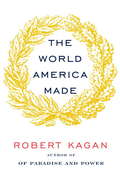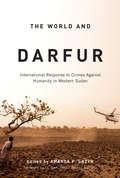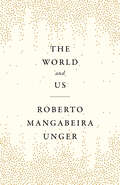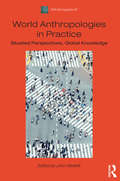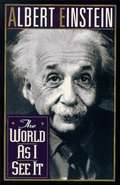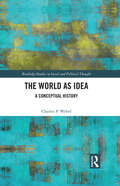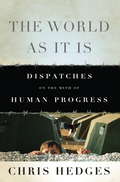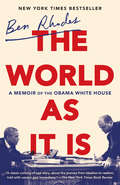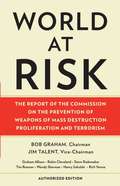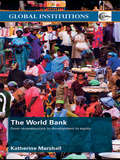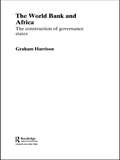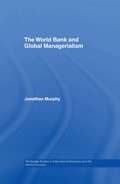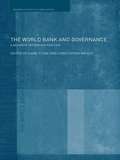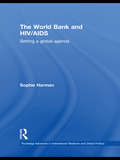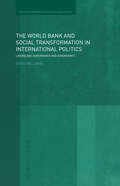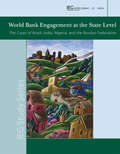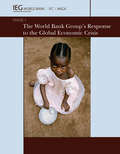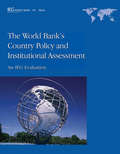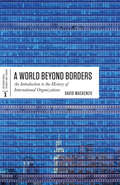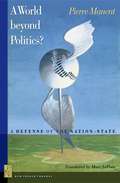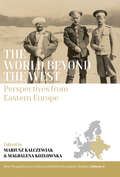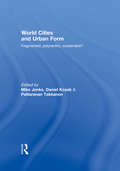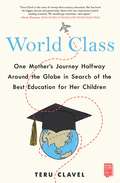- Table View
- List View
The World America Made: The Munk Debate On America Foreign Policy (Munk Debates)
by Robert KaganWhat would the world look like if America were to reduce its role as a global leader in order to focus all its energies on solving its problems at home? And is America really in decline? Robert Kagan, New York Times best-selling author and one of the country's most influential strategic thinkers, paints a vivid, alarming picture of what the world might look like if the United States were truly to let its influence wane. Although Kagan asserts that much of the current pessimism is misplaced, he warns that if America were indeed to commit "preemptive superpower suicide," the world would see the return of war among rising nations as they jostle for power; the retreat of democracy around the world as Vladimir Putin's Russia and authoritarian China acquire more clout; and the weakening of the global free-market economy, which the United States created and has supported for more than sixty years. We've seen this before--in the breakdown of the Roman Empire and the collapse of the European order in World War I. Potent, incisive, and engaging, The World America Made is a reminder that the American world order is worth preserving, and America dare not decline.
The World and Africa
by W. E. B. Du BoisA inquiry into the important role that Africa and African people have played in world history.
The World and Darfur: International Response to Crimes Against Humanity in Western Sudan (Arts Insights Series #24)
by Amanda F. GrzybThis updated edition of The World and Darfur brings together genocide scholars from a range of disciplines - social history, art history, military history, African studies, media studies, literature, political science, and sociology - to provide a cohesive and nuanced understanding of the international response to the crisis in Western Sudan. Contributing authors, including Eric Reeves, Frank Chalk, Eric Markusen, and Samuel Totten, look at the lessons learned from the United Nations' failure to intervene during the Rwandan genocide, the representation of Darfur in the mainstream media, atrocity investigations, activist and NGO campaigns, art exhibitions and political rhetoric, and the role of the international community in the discourse of genocide prevention and intervention. For a complete list of contributors please visit www.mqup.ca
The World and Richard Nixon
by C. L. SulzbergerFormer New York Times foreign correspondent C.L. Sulzberger reviews Nixon's president specifically from a foreign affairs perspective.
The World and Us
by Roberto Mangabeira Unger"A restless visionary striving to realize the highest aspirations of modernity itself."–New York TimesA radical re-envisioning of the human condition by the acclaimed Brazilian philosopherIn The World and Us, Roberto Mangabeira Unger sets out to reinvent philosophy. His central theme is our transcendence, everything in our existence points beyond itself, and its relation to our finitude: everything that surrounds us, and we ourselves, are flawed and ephemeral.He asks how we can live so that we die only once, instead of dying many small deaths; how we can breathe new life and new meaning into the revolutionary movement that has aroused humanity for the last three centuries, but that is now weakened and disoriented; and how we can make sense of ourselves without claiming for human beings a miraculous exception to the general regime of nature. For Unger, philosophy must be the mind on fire, insisting on our prerogative to speak to what matters most.From this perspective, he redefines each of the traditional parts of philosophy, from ontology and epistemology to ethics and politics. He turns moral philosophy into an exploration of the contest between the two most powerful contemporary moral visions: an ethic of self-fashioning and non-conformity, and an ethic of human connection and responsibility.And he turns political philosophy into a program of deep freedom, showing how to democratize the market economy, energize democratic politics, and give the individual worker and citizen the means to flourish amid permanent innovation.
World Anthropologies in Practice: Situated Perspectives, Global Knowledge (Association Of Social Anthropologists Monographs)
by John GledhillIn a post-colonial world, the contributions of anthropologists living outside North America and Western Europe can no longer be treated as marginal. World Anthropologies in Practice demonstrates how global dialogues enable us to draw on local knowledge as well as differences of perspective to help overcome anthropology’s eternal struggle against ethnocentrism and to strengthen the subject’s relevance to the contemporary world.Based on contributions to the ASA-sponsored IUAES World Anthropology Congress in Manchester, UK, this truly global book brings together a wide range of international scholars who might otherwise not talk to each other. Featuring articles from leading figures in the field such as Yolanda Moses, Winnie Lem, Carmen Rial, Miriam Grossi, and Cristina Amescua, the volume covers topics as diverse as the mobility of Brazilian football players, toilets in South Africa, trade unions in Nepal and South Africa, peace-building in southern Thailand, museological approaches in China, the Great East Japan earthquake and tsunami, immigration and race in the United States, and many more. Edited by John Gledhill, the text offers a much-needed insight into the way in which anthropology is developing worldwide and makes a tremendous contribution to the discussion of ‘world anthropologies’. An important, timely work for students and researchers.
The World As I See It
by Albert EinsteinTranslated by Alan Harris. This book is the authorized English translation of the volume 'Mein Weltbild' by Albert Einstein in which he talks about his views on politics, religion, morality, and the place of science in the modern world.
The World as Idea: A Conceptual History (Routledge Studies in Social and Political Thought)
by Charles P. WebelIn The World as Idea Charles P. Webel presents an intellectual history of one of the most influential concepts known to humanity—that of "the world." Webel traces the development of "the world" through the past, depicting the history of the world as an intellectual construct from its roots in ancient creation myths of the cosmos, to contemporary speculations about multiverses. He simultaneously offers probing analyses and critiques of "the world as idea" from thinkers ranging from Plato, Aristotle, and St. Augustine in the Greco-Roman period to Kant, Schopenhauer, Nietzsche, Wittgenstein, Merleau-Ponty, and Derrida in modern times. While Webel mainly focuses on Occidental philosophical, theological, and cosmological notions of worldhood and worldliness, he also highlights important non-Western equivalents prominent in Islamic and Asian spiritual traditions. This ensures the book is a unique overview of what we all take for granted in our daily existence, but seldom if ever contemplate—the world as the uniquely meaningful environment for our lives in particular and for life on Earth in general. The World as Idea will be of great interest to those interested in the "world as idea," scholars in fields ranging from philosophy and intellectual history to political and social theory, and students studying philosophy, the history of ideas, and humanities courses, both general and specialized.
The World As It Is: Dispatches on the Myth of Human Progress
by Chris HedgesMany liberals are disappointed with Barack Obama. Some talk of "betrayal," while others are writing abject letters to the White House asking the president to come back to his "true self." Chris Hedges, however, is a progressive who doesn't feel betrayed. "Obama was and is a brand," he argues. "He is a product of the Chicago political machine. He has been skillfully packaged by the corporate state." In his newest book, Hedges argues that the conscious inertia of the left is destroying the progressive movement. Inaction and empty moral posturing leads not to change, but to an orgy of self-adulation and self-pity.Hedges argues that the gravest danger we face as a nation is not from the far right, although the right may well inherit power. Instead, the threat comes from a bankrupt liberal class that has lost the will to fight and the moral courage to stand up for what it espouses.
The World as It Is: A Memoir of the Obama White House
by Ben RhodesFrom one of Barack Obama’s closest aides comes a revelatory behind-the-scenes account of his presidency—and how idealism can confront harsh reality and still survive—in the tradition of Arthur Schlesinger, Jr.’s A Thousand Days: John F. Kennedy in the White House. <P><P>For nearly ten years, Ben Rhodes saw almost everything that happened at the center of the Obama administration—first as a speechwriter, then as deputy national security advisor, and finally as a multipurpose aide and close collaborator. He started every morning in the Oval Office with the President’s Daily Briefing, traveled the world with Obama, and was at the center of some of the most consequential and controversial moments of the presidency. <P>Now he tells the full story of his partnership—and, ultimately, friendship—with a man who also happened to be a historic president of the United States. Rhodes was not your typical presidential confidant, and this is not your typical White House memoir. <P><P>Rendered in vivid, novelistic detail by someone who was a writer before he was a staffer, this is a rare look inside the most poignant, tense, and consequential moments of the Obama presidency—waiting out the bin Laden raid in the Situation Room, responding to the Arab Spring, reaching a nuclear agreement with Iran, leading secret negotiations with the Cuban government to normalize relations, and confronting the resurgence of nationalism and nativism that culminated in the election of Donald Trump. <P>In The World as It Is, Rhodes shows what it was like to be there—from the early days of the Obama campaign to the final hours of the presidency. It is a story populated by such characters as Susan Rice, Samantha Power, Hillary Clinton, Bob Gates, and—above all—Barack Obama, who comes to life on the page in moments of great urgency and disarming intimacy. <P>This is the most vivid portrayal yet of Obama’s worldview and presidency, a chronicle of a political education by a writer of enormous talent, and an essential record of the forces that shaped the last decade. <P><b>A New York Times Bestseller</b>
World at Risk
by Bob Graham Jim TalentThe bipartisan Commission on the Prevention of Weapons of Mass Destruction Proliferation and Terrorism was established by the U.S. Congress to build on the work of the 9/11 Commission by assessing our nation's progress in preventing weapons of mass destruction proliferation and terrorism, and providing a roadmap to greater security with concrete recommendations for improvement. The Commission has interviewed over 200 experts inside and outside of government. They have met with counterterrorism and intelligence officials here at home and abroad who are working to stop proliferation and terrorism The Commission's report examines the government's current policies and programs, identifies gaps in our government's prevention strategy and recommends ways to close them. The threat of terrorist attacks in the United States and elsewhere is still very real. The world remains at risk There is more that can and must be done. Our security depends on it.
The World Bank: From Reconstruction to Development to Equity (Global Institutions Ser.)
by Katherine MarshallThe World Bank is one of the most important and least understood major international institutions. This book provides a concise, accessible and comprehensive overview of the World Bank's history, development, structure, functionality and activities. These themes are illustrated with a wide variety of case studies drawn from the Bank's int
The World Bank and Africa: The Construction of Governance States (Routledge Advances in International Political Economy #13)
by Graham HarrisonShortlisted for the Inaugural International Political Economy Group annual book prize, 2006. An incisive exploration of the interventions of the World Bank in severely indebted African states. Understanding sovereignty as a frontier rather than a boundary, this key study develops a vision of a powerful international organization reconciling a global political economy with its own designs and a specific set of challenges posed by the African region. This analysis details the nature of the World Bank intervention in the sovereign frontier, investigating institutional development, discursive intervention, and political stabilization. It tackles the methods by which the World Bank has led a project to re-shape certain African states according to a governance template, leading to the presentation of 'success stories' in a continent associated with reform failure.This conceptually innovative book details a political economy of the World Bank in Africa that is both globally contextualized and attentive to individual states. It is the only volume to look at the bank's relations with Africa and will interest all students and researchers of African politics and the World Bank.
The World Bank and Global Managerialism (Routledge Studies in International Business and the World Economy)
by Jonathan MurphyIn recent years, a great deal of scholarly and popular ink has been spilled on the subject of globalization. Relatively few scholars have addressed the political sociology of globalization, and specifically, the emergence of global class formations and a nascent global governance framework. This book is a contribution towards redressing this imbalance. The book traces the emergence of the World Bank as a key driver of globalization, and as a central source of an evolving form of elite-driven transnational governance which the author describes as ‘global managerialism’. The book argues that the Bank has expanded its sphere of activity far beyond provision of low-cost capital for development projects, and plays a central role in pursuing global economic and social policy homogenization. The World Bank and Global Managerialism features a new theoretical approach to globalization, developed through an analytical exposition of the key stages in the institution’s growth since its creation at the Bretton Woods conference of 1944. The author details the contemporary Bank’s central policy framework, which includes the intertwining of public and private initiatives and the extension of global governance into ever-wider policy and geographic spheres. He also argues that contemporary globalization marks the emergence of a transnational elite, straddling the corporate, government, and civil society sectors. The book provides two detailed case studies that demonstrate the practical analytical utility of the theory of global managerialism. The theoretical approach provides a robust but flexible framework for understanding contemporary global development. It is essential reading for courses in areas such as International Organizations, Global Political Economy, and Globalization and its Discontents, and is also relevant to students of development policy and international economic architecture, among others.
The World Bank and Governance: A Decade of Reform and Reaction (Routledge Studies in Globalisation)
by Diane Stone Christopher WrightThis timely book offers the first critical examination of World Bank policy reforms and initiatives during the past decade. The World Bank is viewed as one of the most powerful international organizations of our time. The authors critically analyze the influence of the institution’s policy and engagement during the past decade in a variety of issue areas, including human rights, domestic reform, and the environment. The World Bank and Governance delves into the bowels of the World Bank, exploring its organizational structure, professional culture and bureaucratic procedures, illustrating how these shape its engagement with an increasingly complex, diverse and challenging operational environment. The book includes chapters on two under-researched divisions of the World Bank: the International Finance Corporation and the Multilateral Investment Guarantee Agency. Several illuminating country studies are also included, analyzing the World Bank's activities in Argentina, Bolivia, Lebanon, Hungary and Vietnam. This volume will be of great interest to students and scholars of international relations, development, politics and economics.
The World Bank and HIV/AIDS: Setting a global agenda (Routledge Advances in International Relations and Global Politics)
by Sophie HarmanThe governance of the HIV/AIDS pandemic has come to represent a multi-faceted and complex operation in which the World Bank has set and sustained the global agenda for by the World Bank. The governance of HIV/ AIDS. Through economic incentive they have restructured the is a political foundations of countries in sub-Saharan Africa and the pursuit of change in state, project that seeks to embed liberal practice through individual, state, and societal community behaviour. At the heart of this practice is the drive to impose blueprint neoliberal market-based solutions on a personal-global issue. This book unravels how the Bank’s good governance agenda and commitment to participation, ownership and transparency manifests itself in practice, through the Multi-Country AIDS Program (MAP), and crucially how it is pushing an agenda that sees a shift in both global health interventions and state configuration in sub-Saharan Africa. The book considers the mechanisms used by the Bank – and the problems therein – to engage the state, civil society and the individual in responding to the HIV/AIDS crisis, and how these mechanisms have been exported to other global projects such as the Global Fund and UNAIDS. Harman argues in conclusion that not only has the Bank set the global agenda for HIV/AIDS, but underpinning this is a wider commitment to liberal governance reform through neoliberal incentive. Making an important contribution to our understanding of global governance and international politics, this book will be of interest to students and scholars of politics, international political economy, international relations, development studies and civil society.
The World Bank and Social Transformation in International Politics: Liberalism, Governance and Sovereignty (Routledge Studies in Globalisation)
by David WilliamsIn the 1990s the World Bank changed its policy to take the position that the problems of poverty and governance are inextricably linked, and improving the governance of its borrower countries became increasingly accepted as a legitimate and important part of the World Bank’s development activities. This book examines why the World Bank came to see good governance as important and evaluate what the World Bank is doing to improve the governance of its borrower countries. David Williams examines changing World Bank policy since the late 1970s to show how a concern with good governance grew out of the problems the World Bank was experiencing with structural adjustment lending, particularly in Sub-Saharan Africa. The book provides an account of the early years of the World Bank and traces the increasing acceptance of the idea of good governance within the Bank through the 1990s, while systematically relating the policies of good governance to liberalism. The author provides a detailed case study of World Bank lending to Ghana to demonstrate what the attempt to improve ‘governance’ looks like in practice. Williams assesses whether the World Bank has been successful in its attempts to improve governance, and draws out some of the implications of the argument for how we should think about sovereignty, for how we should understand the connections between liberalism and international politics. This book will be of interest to students and scholars of international relations, politics, economics, development and African studies.
World Bank Engagement at the State Level: The Cases of Brazil, India, Nigeria, and Russia
by World BankThis report is a pilot cross-country study that summarizes 10 years (1998-2008) of the World Bank's engagement at the state level in selected large federal countries and combines elements of a country assistance evaluation and a thematic review. It looks at several strategic and operational questions posed by state-level engagement, among them the selection of states, the scope, and the modalities of engagement. According to the report, two tendencies-often in tension-featured in most approaches for selection of states for direct engagement. One was to support better-performing, reformist states, while the other was to support the poorest states as a more direct route to reducing poverty. Overall, the study confirms the desirability of continued selective lending in a few focus states. Among other findings: the Bank's engagement with progressive reformist states has added value and has been highly appreciated, but in order to enhance the poverty impact of state level interventions, greater weight should be given to the needs of poorest states by balancing states' propensity to reform and the concentration of poverty within them; continued focus on public finance management appears sound, irrespective of whether engagement is confined to this area or serves as an entry point for broader engagement; there is considerable scope for greater impact from knowledge transfer between states and countries and expanded knowledge services to the state-level clients.
The World Bank Group's Response to the Global Economic Crisis
by The World BankThe World Bank Group has responded to the global economic crisis with a strong countercyclical expansion of financing. Its disbursements of $80 billion in the past two fiscal years were the largest among the Multilateral Development Banks. There was notable variation across the WBG, with vastly increased IBRD lending, moderately higher IDA financing, and overall responses from IFC and MIGA that were not counter-cyclical. The differences reflected the interplay of financial capacities, business models, and available instruments. While the level of financial flows is one aspect of crisis response, the crucial aspect is the results achieved with such financing and the related knowledge work of the WBG. The question going forward concerns the effectiveness and sustainability of the crisis response. Effective and efficient use of funds to sustain growth and ensure macroeconomic stability is more important than ever in view of emerging fiscal deficits and financial stress in client countries. It is vital that the WBG support help clients keep focused on structural reforms for inclusive and environmentally sustainable growth. The WBG needs mechanisms to ensure early warning and preparedness in the face of an increasingly uncertain global environment. Skills and institutional capabilities in key thematic areas, such as the financial sector, need to be maintained. Attention is also needed to ensure that knowledge activities are not crowded out in the face of tight budgets and resource demands resulting from increased lending.
The World Bank's Country Policy and Institutional Assessment
by The World BankThe evaluation finds that the content of the World Bank's Country Policy and Institutional Assessment (CPIA) is largely relevant for growth and poverty reduction in the sense that it maps well with the determinants of growth and poverty reduction identified in the economics literature. However, some CPIA criteria need to be revised (in particular trade and finance), and one needs to be added (assessment of disadvantaged socio-economic groups). Second, the evaluation finds that the CPIA ratings are in general reliable and correlate well with similar indicators. The World Bank's internal review process helps guard against potential biases in having Bank staff rate countries on which their work programs depend. The CPIA ratings are found to correlate better with similar indicators for middle income countries than for low income countries. This could be because there is more information available on middle income countries, which increases the likelihood of different institutions having similar assessments on them. This could also be because the CPIA rating exercise takes into account the stage of development, which is more pertinent for low income countries, and which also subject the ratings of those countries to more judgment in an exercise that is already centered on staff judgment.
A World Beyond Borders: An Introduction To The History Of International Organizations (International Themes And Issues Ser. #1)
by David MacKenzieThis short and well-written overview provides essential information on the history of international organizations (IOs), with particular focus on the League of Nations, the development of the United Nations, and the UN system. Starting at the beginning of the twentieth century, when there were very few international organizations in existence, A World Beyond Borders traces the growth of IOs through to the close of the century, when there were literally thousands at the heart of the international system. Following this chronological order, the book examines how international organizations became the major legal, moral, and cultural forces that they are today, involved in all aspects of international relations including peacekeeping, disarmament, peace resolution, human rights, diplomacy, and environmentalism. This book is the first in the Canadian Historical Association / University of Toronto Press International Themes and Issues Series, which is dedicated to publishing concise, focused overviews of topics that are of international significance in the study of history.
A World Beyond Politics?: A Defense Of The Nation-state
by Pierre Manent Marc A. LePainWe live in the grip of a great illusion about politics, Pierre Manent argues in A World beyond Politics? It's the illusion that we would be better off without politics--at least national politics, and perhaps all politics. It is a fantasy that if democratic values could somehow detach themselves from their traditional national context, we could enter a world of pure democracy, where human society would be ruled solely according to law and morality. Borders would dissolve in unconditional internationalism and nations would collapse into supranational organizations such as the European Union. Free of the limits and sins of politics, we could finally attain the true life.
The World beyond the West: Perspectives from Eastern Europe (New Perspectives on Central and Eastern European Studies #3)
by Mariusz Kałczewiak and Magdalena KozłowskaNo matter how one defines its extent and borders, Eastern Europe has long been understood as a liminal space, one whose undeniable cultural and historical continuities with Western Europe have been belied by its status as an “Other” in the Western imagination. Across illuminating and provocative case studies, The World beyond the West focuses on the region’s ambiguous relationship to historical processes of colonialism and Orientalism. In exploring encounters with distant lands through politics, travel, migration, and exchange, it places Eastern Europe at the heart of its analysis while decentering the most familiar narratives and recasting the history of the region.
World Cities and Urban Form: Fragmented, Polycentric, Sustainable?
by Mike Jenks Daniel Kozak Pattaranan TakkanonThis book presents new research and theory at the regional scale showing the forms metropolitan regions might take to achieve sustainability. At the city scale the book presents case studies based on the latest research and practice from Europe, Asia and North America, showing how both planning and flagship design can propel cities into world class status, and also improve sustainability. The contributors explore the tension between polycentric and potentially sustainable development, and urban fragmentation in a physical context, but also in a wider cultural, social and economic context.
World Class: One Mother's Journey Halfway Around the Globe in Search of the Best Education for Her Children
by Teru ClavelAn eye-opening firsthand exploration of why Asian students are outpacing their American counterparts, and how to help our children excel in today’s competitive world.When Teru Clavel had young children, the oldest barely two, she watched as her friends and fellow parents vied to secure a spot in the right New York City preschools. Following a gut feeling that a truly world-class education involves more than the privilege and ennui of elite private schools, Teru and her family moved to Asia, embarking on a ten-year-long journey through the public schools of Hong Kong, Shanghai, and Tokyo. During this time, Teru discovered firsthand why students in China and Japan are far outpacing their American counterparts. In Hong Kong, her children’s school was nicknamed The Prison for its foreboding, austere facilities, yet her three-year-old loved his teachers and his nightly homework. In Shanghai, in a school without flush toilets, the students were kept late not out of punishment but to master the day’s lesson. In Tokyo, her children and their classmates were responsible for school chores, like preparing and serving school lunches—lunches that featured grilled fish, stewed vegetables, and miso soup, not hot dogs and french fries. These schools were low-tech and bare-bones, with teachers who demanded obedience and order. Yet Teru was shocked to discover that her children thrived in these foreign and academically competitive cultures; they learned to be independent, self-confident, and resilient, and, above all, they developed a deep and abiding love of learning. The true culture shock came when Teru returned to the States and found their top-rated California school woefully ill-prepared to challenge her children. Her kids were passing, but the schools were failing them. In this revelatory book, Teru shares what she learned during her decade in Asia, providing practical tips and takeaways to bring the best of Asia’s education and parenting philosophies into American homes and schools. Written with warmth and humor, World Class is an insightful guide to set your children on a path towards lifelong learning and success.
